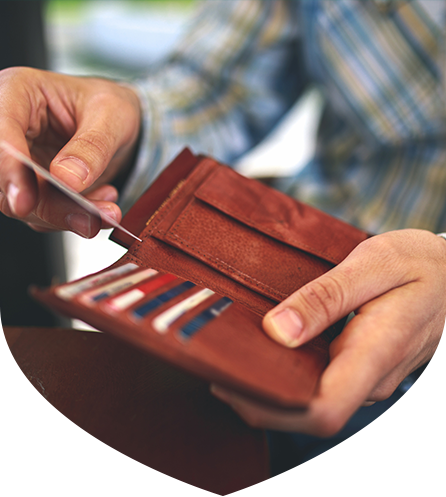Financial Wellness
Beware of 'Card Declined' Message Scams
Rob Gilbert thought he was making a routine online purchase for himself and gifts for his mom's upcoming birthday after clicking an ad from a major retailer.
But when Gilbert went to check out, he got a "card declined" message.
Not thinking much of it, he was using a new card, and he had forgotten the three-digit code on the back. Instead, he used his debit card number for the purchase.
Little did he know, he wasn't declined after all—it was a scam. Both cards were almost immediately used for fraudulent charges.
But when Gilbert went to check out, he got a "card declined" message.
Not thinking much of it, he was using a new card, and he had forgotten the three-digit code on the back. Instead, he used his debit card number for the purchase.
Little did he know, he wasn't declined after all—it was a scam. Both cards were almost immediately used for fraudulent charges.
Fraudsters setting up convincing fake sites
The Better Business Bureau (BBB) is warning the public that an increasing number of consumers are reporting similar experiences to its BBB Scam Tracker, which displays reports of scams across the world.Victims reported shopping on what they thought was a legitimate website via an email link or social media ad. These fake sites typically prompt customers to enter personal and payment information. After entering their details, customers receive a "card declined" message, or one that reads "your card did not go through for some reason."
Thinking they made a mistake or that their account didn't have sufficient funds, the consumer turned to another form of payment.
Later, they received a legitimate email or text from their card issuer saying fraudulent purchases were charged to their account.
Gilbert, who also reported his experience to the BBB, said his first card was declined, but his second card appeared to process correctly, complete with order and tracking numbers. Then, he received notices that both cards were charged $74.
Fortunately, Gilbert's card issuer canceled both cards and refunded his money.
Other consumers who reported the scam to the BBB said their cards were fraudulently charged $200 and $2,500, respectively.
"If you are shopping online and your card declines, resist the urge to use a different card," BBB spokeswoman Melanie McGovern told USA TODAY. "Instead, reach out to your bank to see if there is a problem."
McGovern said if you suspect fraud, monitor your credit card transactions for any unusual activity and report it to the BBB's Scam Tracker.
Ads on Social Media
Social media advertising poses significant risks to users, particularly when it comes to scams like the "card declined" fraud. Many people mistakenly assume that ads on popular platforms are automatically trustworthy, but this is far from the truth. Social media companies often do not thoroughly vet their advertisers, allowing malicious actors to exploit this false sense of security.To protect yourself, always be skeptical of ads, even on familiar platforms. Verify the legitimacy of unfamiliar companies independently, and never enter payment information without thoroughly researching the seller and checking for secure payment methods. Remember, a reputable company will never pressure you to complete a transaction immediately or ask for sensitive information through unsecured channels.
Tips to avoid online purchase scams
Verify that the website is legitimate. Scammers often create fake, lookalike websites to trick shoppers into thinking they are buying from the actual business. Take a close look at the URL—it may be off by a letter or two—and check that the website is secure by verifying "https://" is in front of the web address.Watch out for fake emails, texts and ads. Scammers often impersonate businesses in fake emails, text messages and social media advertisements. Don't trust messages that come unsolicited, and always verify a link before clicking on it. If you're in doubt, search for the business website on your own.
Don't be lured by great offers. If the price seems too good to be true, it could be a scam. Do some comparison pricing of the product.
Research the business. Before purchasing, look up customer reviews online and search for the business on BBB.org. You also can search on BBB Scam Tracker to see if it is a scam. Use a credit card for extra protection. Credit card companies offer protection against fraud, so you should be able to dispute any unexpected charges on your account.
Understand your credit and debit card protections. Get up to date on what protections you have by contacting your bank or researching your protections. Set purchase limits, travel restrictions and set up notifications for when purchases are made.
Resources: USA Today, Better Business Bureau


